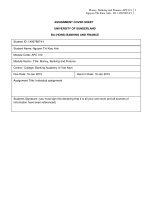International banking and money market
Bạn đang xem bản rút gọn của tài liệu. Xem và tải ngay bản đầy đủ của tài liệu tại đây (438.41 KB, 50 trang )
International Banking
and Money Market
Chapter Objective:
6
Chapter Six
INTERNATIONAL
FINANCIAL
MANAGEMENT
This chapter serves to begin our discussion of
world financial markets and institutions.
Third Edition
EUN / RESNICK
6-1
Copyright © 2003 by The McGraw-Hill Companies, Inc. All rights reserved.
Chapter Six Outline
International Banking Services
The World’s Largest Banks
6-2
Copyright © 2003 by The McGraw-Hill Companies, Inc. All rights reserved.
Chapter Six Outline
International Banking Services
Reasons for International Banking
6-3
Copyright © 2003 by The McGraw-Hill Companies, Inc. All rights reserved.
Chapter Six Outline
International Banking Services
Reasons for International Banking
Types of International Banking Offices
Correspondent Bank
Representative Offices
Foreign Branches
Subsidiary and Affiliate Banks
Edge Act Banks
Offshore Banking centers
International Banking Facilities
6-4
Copyright © 2003 by The McGraw-Hill Companies, Inc. All rights reserved.
Chapter Six Outline
International Banking Services
Reasons for International Banking
Types of International Banking Offices
Capital Adequacy Standards
6-5
Copyright © 2003 by The McGraw-Hill Companies, Inc. All rights reserved.
Chapter Six Outline
International Banking Services
Reasons for International Banking
Types of International Banking Offices
Capital Adequacy Standards
International Money Market
6-6
Eurocurrency Markets
Eurocredits
Forward Rate Agreements
Euronotes
Euro-Medium-Term Notes
Eurocommercial Paper
Copyright © 2003 by The McGraw-Hill Companies, Inc. All rights reserved.
Chapter Six Outline
International Banking Services
Reasons for International Banking
Types of International Banking Offices
Capital Adequacy Standards
International Money Market
International Debt Crisis
History
Debt-for-Equity Swaps
The Solution: Brady Bonds
6-7
Copyright © 2003 by The McGraw-Hill Companies, Inc. All rights reserved.
Chapter Six Outline
International Banking Services
Reasons for International Banking
Types of International Banking Offices
Capital Adequacy Standards
International Money Market
International Debt Crisis
Japanese Banking Crisis
6-8
Copyright © 2003 by The McGraw-Hill Companies, Inc. All rights reserved.
Chapter Six Outline
International Banking Services
Reasons for International Banking
Types of International Banking Offices
Capital Adequacy Standards
International Money Market
International Debt Crisis
Japanese Banking Crisis
The Asian Crisis
6-9
Copyright © 2003 by The McGraw-Hill Companies, Inc. All rights reserved.
International Banking Services
International Banks do everything domestic banks do and:
Arrange trade financing.
Arrange foreign exchange.
Offer hedging services for foreign currency receivables
and payables through forward and option contracts.
Offer investment banking services (where allowed).
6-
Copyright © 2003 by The McGraw-Hill Companies, Inc. All rights reserved.
The World’s 10 Largest Banks
Citigroup
U.S.
Mizuho Bank/ Mizuho Corp Bank
Japan
HSBC Holdings
U.K.
Bank of America
France
JP Morgan Chase
U.S.
Deutsche Bank
Germany
Royal Bank of Scotland Group
U.K.
Sumitomo Mitsui Banking Group
Japan
HypoVereinsbank
Germany
UFJ Bank Ltd.
Japan
6-
Copyright © 2003 by The McGraw-Hill Companies, Inc. All rights reserved.
Reasons for International Banking
Low Marginal Costs
Managerial and marketing knowledge developed at
home can be used abroad with low marginal costs.
6-
Copyright © 2003 by The McGraw-Hill Companies, Inc. All rights reserved.
Reasons for International Banking
Low Marginal Costs
Knowledge Advantage
The foreign bank subsidiary can draw on the parent
bank’s knowledge of personal contacts and credit
investigations for use in that foreign market.
6-
Copyright © 2003 by The McGraw-Hill Companies, Inc. All rights reserved.
Reasons for International Banking
Low Marginal Costs
Knowledge Advantage
Home Nation Information Services
Local firms in a foreign market may be able to obtain
more complete information on trade and financial
markets in the multinational bank’s home nation than is
obtainable from foreign domestic banks.
6-
Copyright © 2003 by The McGraw-Hill Companies, Inc. All rights reserved.
Reasons for International Banking
Low Marginal Costs
Knowledge Advantage
Home Nation Information Services
Prestige
Very large multinational banks have high perceived
prestige, which can be attractive to new clients.
6-
Copyright © 2003 by The McGraw-Hill Companies, Inc. All rights reserved.
Reasons for International Banking
Low Marginal Costs
Knowledge Advantage
Home Nation Information Services
Prestige
Regulatory Advantage
Multinational banks are often not subject to the same
regulations as domestic banks.
6-
Copyright © 2003 by The McGraw-Hill Companies, Inc. All rights reserved.
Reasons for International Banking
Low Marginal Costs
Knowledge Advantage
Home Nation Information Services
Prestige
Regulatory Advantage
Wholesale Defensive Strategy
Banks follow their multinational customers abroad to
avoid losing their business at home and abroad.
6-
Copyright © 2003 by The McGraw-Hill Companies, Inc. All rights reserved.
Reasons for International Banking
Low Marginal Costs
Knowledge Advantage
Home Nation Information Services
Prestige
Regulatory Advantage
Wholesale Defensive Strategy
Retail Defensive Strategy
6-
Multinational banks also compete for retail services such as
travelers checks, tourist and foreign business market.
Copyright © 2003 by The McGraw-Hill Companies, Inc. All rights reserved.
Reasons for International Banking
Knowledge Advantage
Home Nation Information Services
Prestige
Regulatory Advantage
Wholesale Defensive Strategy
Retail Defensive Strategy
Transactions Costs
Multinational banks may be able to circumvent
government currency controls.
6-
Copyright © 2003 by The McGraw-Hill Companies, Inc. All rights reserved.
Reasons for International Banking
Home Nation Information Services
Prestige
Regulatory Advantage
Wholesale Defensive Strategy
Retail Defensive Strategy
Transactions Costs
Growth
Foreign markets may offer opportunities to growth not
found domestically
6-
Copyright © 2003 by The McGraw-Hill Companies, Inc. All rights reserved.
Reasons for International Banking
Prestige
Regulatory Advantage
Wholesale Defensive Strategy
Retail Defensive Strategy
Transactions Costs
Growth
Risk Reduction
Greater stability of earnings due to diversification
6-
Copyright © 2003 by The McGraw-Hill Companies, Inc. All rights reserved.
Types of International
Banking Offices
Correspondent Bank
Representative Offices
Foreign Branches
Subsidiary and Affiliate Banks
Edge Act Banks
Offshore Banking Centers
International Banking Facilities
6-
Copyright © 2003 by The McGraw-Hill Companies, Inc. All rights reserved.
Correspondent Bank
A correspondent banking relationship exists when two
banks maintain deposits with each other.
Correspondent banking allows a bank’s MNC client to
conduct business worldwide through his local bank or its
correspondents.
6-
Copyright © 2003 by The McGraw-Hill Companies, Inc. All rights reserved.
Representative Offices
6-
A representative office is a small service facility
staffed by parent bank personnel that is designed to
assist MNC clients of the parent bank in dealings
with the bank’s correspondents.
Representative offices also assist with information
about local business customs, and credit evaluation
of the MNC’s local customers.
Copyright © 2003 by The McGraw-Hill Companies, Inc. All rights reserved.
Foreign Branches
A foreign branch bank operates like a local bank, but is
legally part of the the parent.
Subject to both the banking regulations of home
country and foreign country.
Can provide a much fuller range of services than a
representative office.
Branch Banks are the most popular way for U.S. banks to
expand overseas.
6-
Copyright © 2003 by The McGraw-Hill Companies, Inc. All rights reserved.









